Your hair is your crowning glory. It’s an extension of your personality and style – the final adornment to your look. Everyone wants to have perfect tresses, but unfortunately it’s a matter of genetics as well as external influences.
 One thing is definite, proper hair care is a must. The correct hair regime can maintain and enhance the quality of your hair, and help to protect against and repair environmental pollutants.
One thing is definite, proper hair care is a must. The correct hair regime can maintain and enhance the quality of your hair, and help to protect against and repair environmental pollutants.
Whilst everyone has the same amount of hair follicles, not everyone is blessed with the same hair type or quality – it may be thick, medium or fine, and straight, wavy or curly. The quality of hair care will determine the beauty and strength of the hair. A good hair regime will nourish and moisturise the hair and scalp and repair any damage to the hair.
Is it necessary to use conditioner after shampoo?
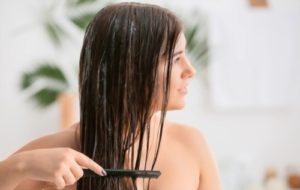 Shampoo can be extremely drying on the hair, it is used to get rid of dirt, oil and product build-up. Application should be mainly concentrated on the scalp and not the hair. Massage into the scalp for three minutes and then allow it to clean the rest of the hair as it is rinsed out. Conditioner is applied to replenish the moisture in the middle and ends of the hair. It softens, smoothes and detangles the hair and helps to prevent breakage and damage. Skipping the conditioner can leave the hair weak and brittle.
Shampoo can be extremely drying on the hair, it is used to get rid of dirt, oil and product build-up. Application should be mainly concentrated on the scalp and not the hair. Massage into the scalp for three minutes and then allow it to clean the rest of the hair as it is rinsed out. Conditioner is applied to replenish the moisture in the middle and ends of the hair. It softens, smoothes and detangles the hair and helps to prevent breakage and damage. Skipping the conditioner can leave the hair weak and brittle.
Why choose a conditioner made from natural oils?
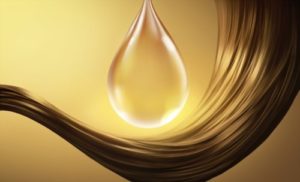 Natural oils cannot be ignored when it comes to caring for our hair. Full of vital nutrients essential for strong and healthy hair and scalp, including omega-3, omega-6, and omega-9 fatty acids, plus vitamins and antioxidants that penetrate the follicles, they can make a real difference, treating and conditioning the hair and scalp simultaneously.
Natural oils cannot be ignored when it comes to caring for our hair. Full of vital nutrients essential for strong and healthy hair and scalp, including omega-3, omega-6, and omega-9 fatty acids, plus vitamins and antioxidants that penetrate the follicles, they can make a real difference, treating and conditioning the hair and scalp simultaneously.
Oils can combat a dry scalp and dandruff, prevent oily scalp and hair, stimulate hair growth, repair heat and chemical damage, lock in moisture, enhance curls, add shine, prevent frizziness, split ends, and heat and styling damage, and protect against environmental damage and the effects of pollution. Not to mention that they are better for the environment and can limit your exposure to harmful chemicals and synthetic ingredients.
So exactly which one is suited for you?
Dry irritated scalp & dandruff
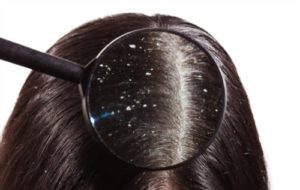 Causes: If you have a dry, irritated, itchy and flaking scalp you may think that you have dandruff but the two conditions are actually caused by two opposites. With a dry scalp the skin becomes irritated and flakes off, whereas with dandruff the scalp produces too much oil which causes the skin cells to accumulate and shred. A dry scalp may be caused by cold, dry air, a reaction to products causing contact dermatitis, or simply age. The main cause of dandruff is seborrheic dermatitis which turns the skin oily and red with white or yellow flaking skin. Fungus, which is normal on people’s scalp, increases due to stress, hormones, age or not washing the scalp enough and leading to a build up of oil, thus causing the skin cells to multiply quicker than usual. The skin cells build up, causing flakes which stick to the oily scalp.
Causes: If you have a dry, irritated, itchy and flaking scalp you may think that you have dandruff but the two conditions are actually caused by two opposites. With a dry scalp the skin becomes irritated and flakes off, whereas with dandruff the scalp produces too much oil which causes the skin cells to accumulate and shred. A dry scalp may be caused by cold, dry air, a reaction to products causing contact dermatitis, or simply age. The main cause of dandruff is seborrheic dermatitis which turns the skin oily and red with white or yellow flaking skin. Fungus, which is normal on people’s scalp, increases due to stress, hormones, age or not washing the scalp enough and leading to a build up of oil, thus causing the skin cells to multiply quicker than usual. The skin cells build up, causing flakes which stick to the oily scalp.
What to do: Scalp health is key to healthy hair. Wash hair three times a week. Dry scalp can also be treated with application of oil left on scalp overnight once a week. For dandruff add a few drops of lemongrass essential oil to your shampoo.
Recommended treatment oil: Dry scalp: coconut oil, jojoba oil, almond oil, or argan oil
Recommended conditioner: Dry scalp: jojoba conditioner; Dandruff: black seed conditioner
Dry, dull hair
 Causes: The hair is made up of three layers. In healthy hair the outer layer, the cuticle, retains its natural oils and protects the inner layers, also reflecting light and making the hair shine. When the outer layer doesn’t retain enough moisture, due to sun or wind exposure, living in a hot and humid country, too much hot styling, using harsh hair care products, frequently swimming in chlorinated or salty water, or even washing your hair too often, it breaks down and the hair appears dull and unhealthy. The hair also generally gets drier as we age. Hormonal changes during pregnancy and menopause can dry the hair.
Causes: The hair is made up of three layers. In healthy hair the outer layer, the cuticle, retains its natural oils and protects the inner layers, also reflecting light and making the hair shine. When the outer layer doesn’t retain enough moisture, due to sun or wind exposure, living in a hot and humid country, too much hot styling, using harsh hair care products, frequently swimming in chlorinated or salty water, or even washing your hair too often, it breaks down and the hair appears dull and unhealthy. The hair also generally gets drier as we age. Hormonal changes during pregnancy and menopause can dry the hair.
What to do: Only wash the hair a maximum of twice a week. Avoid blow drying the hair and styling with heated tools. Use a natural oil for overnight conditioning mask once a week, and apply to dry ends on non-wash days, and before any heat treatment or swimming.
Recommended treatment oil: coconut oil, argan oil, jojoba oil, wheat germ oil, almond oil, or grapeseed oil
Recommended conditioner: wheat germ conditioner, jojoba conditioner.
Damaged hair
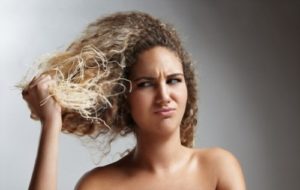 Causes: Too much heat-styling, lack of conditioning, excessive use of chemicals such as hair dyes, perms and relaxers, harsh hair products, and even over brushing (especially when wet) can take the hair beyond just dry. The hair becomes straw-like: it’s brittle, totally lifeless. Hair breaks or splits, it’s difficult to detangle, maybe there’s even white nodules at the end of the strands, and unruly hairs stick out. The hair will have little movement, feels stiff, lacks elasticity, is difficult to style or doesn’t retain the style, and may crunch when you touch it. Basically the cuticle has broken down, and is lifting or fraying, and the overlapping cells are unable to lay flat which causes the hair to become extremely fragile. Hair may also appear ‘frizzy’.
Causes: Too much heat-styling, lack of conditioning, excessive use of chemicals such as hair dyes, perms and relaxers, harsh hair products, and even over brushing (especially when wet) can take the hair beyond just dry. The hair becomes straw-like: it’s brittle, totally lifeless. Hair breaks or splits, it’s difficult to detangle, maybe there’s even white nodules at the end of the strands, and unruly hairs stick out. The hair will have little movement, feels stiff, lacks elasticity, is difficult to style or doesn’t retain the style, and may crunch when you touch it. Basically the cuticle has broken down, and is lifting or fraying, and the overlapping cells are unable to lay flat which causes the hair to become extremely fragile. Hair may also appear ‘frizzy’.
What to do: Stop all chemical treatments and heat treatment until the hair is in better condition. Switch to a satin pillowcase, to reduce friction. Condition, condition, condition! Use oils which can penetrate into the hair to reduce water absorption and reduce further damage from the repeated swelling and drying of the hair shaft. An oil can also fill in the gaps in the cuticles and provide lubrication to prevent further damage and protection against friction. Use overnight oil treatments, pre-wash condition, and apply to dry ends on non-wash days, and before any heat treatment.
Recommended treatment oil: coconut oil, jojoba oil, almond oil
Recommended conditioner: wheat germ conditioner
Split ends
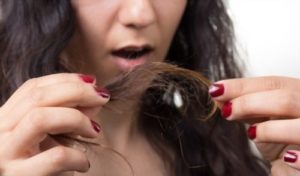 Causes: Over-brushing hair, excessive chemical treatments, too much heat, and lack of conditioning can cause split ends, especially when the natural oil from the scalp doesn’t reach down to the ends. Split ends are very common, but care needs to be taken that the split doesn’t go all the way up the hair shaft and cause breakage. Ideally the hair should be trimmed every 6-10 weeks to protect against split ends.
Causes: Over-brushing hair, excessive chemical treatments, too much heat, and lack of conditioning can cause split ends, especially when the natural oil from the scalp doesn’t reach down to the ends. Split ends are very common, but care needs to be taken that the split doesn’t go all the way up the hair shaft and cause breakage. Ideally the hair should be trimmed every 6-10 weeks to protect against split ends.
What to do: Use an oil to condition the ends and leave for two hours or overnight, apply extra oil to the ends as needed.
Recommended treatment oil: coconut oil, jojoba oil, almond oil, olive oil
Recommended conditioner: wheat germ conditioner
Coarse and undefined curls
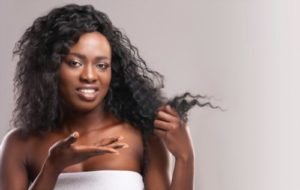 Causes: The follicle shape causes curly hair. A round follicle produces straight hair, and an oval one, curly. The range of curl can range from slightly wavy to tight compact curls. Curly hair can look sensational but needs a lot of care. It is also often dry and brittle, can break easily, and can be prone to frizziness and unmanageable. Extremely curly hair is also very difficult to brush.
Causes: The follicle shape causes curly hair. A round follicle produces straight hair, and an oval one, curly. The range of curl can range from slightly wavy to tight compact curls. Curly hair can look sensational but needs a lot of care. It is also often dry and brittle, can break easily, and can be prone to frizziness and unmanageable. Extremely curly hair is also very difficult to brush.
What to do: Wash the hair 2-3 times a week. Use a natural oil that adds elasticity and hydration for an overnight conditioning mask once a week, and use as a styling product to define curls and diminish frizz. Comb the hair only while it is being conditioned with a wide combed tooth.
Recommended treatment oil: argan oil; coconut oil
Recommended conditioner: wheat germ conditioner
Oily Scalp
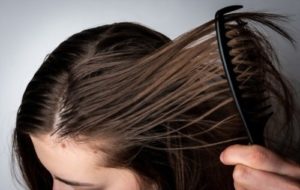 Causes: Oily hair is the result of an oily scalp, when the scalp produces excessive amounts of sebum. It can be caused when the scalp dries out due to over-washing or hot weather, which causes the sebaceous glands to over react and produce too much sebum.
Causes: Oily hair is the result of an oily scalp, when the scalp produces excessive amounts of sebum. It can be caused when the scalp dries out due to over-washing or hot weather, which causes the sebaceous glands to over react and produce too much sebum.
What to do: Reduce washing to 3 times a week, and use only cold or lukewarm water as hot water stimulates the sebaceous glands. Do a pre-shampoo scalp treatment with oil to regulate sebum production. Never use leave-in conditioners or anything which will add extra moisture. Avoid touching and brushing the hair as this accentuates the problem.
Recommended treatment oil: jojoba oil
Recommended conditioner: jojoba conditioner
Grey hair
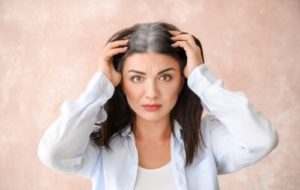 Causes: As we age the pigment cells in our hair die over time and stop producing melanin so the hair looses its colour, becoming grey, silver or white. This causes the cuticle to become thinner, and the hair generally becomes fine and may be dry and more prone to damage. Therefore it is necessary to readjust your previous hair regime.
Causes: As we age the pigment cells in our hair die over time and stop producing melanin so the hair looses its colour, becoming grey, silver or white. This causes the cuticle to become thinner, and the hair generally becomes fine and may be dry and more prone to damage. Therefore it is necessary to readjust your previous hair regime.
What to do: Treat as per dull/dry hair.
Recommended treatment oil: coconut oil, argan oil, jojoba oil, wheat germ oil, almond oil, or grapeseed oil
Recommended conditioner: cobra (snake) oil conditioner
Fine hair
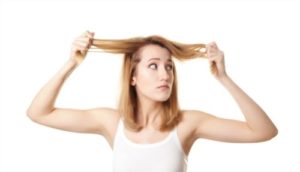 Causes: Fine hair is genetic – the diameter of the strand is narrow, which makes it much more fragile and prone to breakage. It often has difficulty retaining moisture or holding a style, and is prone to frizz and flyaways at the hint of moisture.
Causes: Fine hair is genetic – the diameter of the strand is narrow, which makes it much more fragile and prone to breakage. It often has difficulty retaining moisture or holding a style, and is prone to frizz and flyaways at the hint of moisture.
What to do: Restrict washing to 2-3 times a week. Use a lightweight oil as a hot oil treatment for 15 minutes prior to shampoo to help seal and retain moisture whilst preventing breakage. Use a spritz of grape seed oil and distilled water to tame frizz and flyaways, add oil to ends as needed between washes.
Recommended treatment oil: almond oil, grapeseed oil
Recommended conditioner: jojoba conditioner every other wash. For in-between wash use a couple of drops of grape seed oil as a leave-in conditioner.
Slow-growing hair
 Causes: The speed at what our hair grows is genetic. If the hair appears to be growing slowly it may also be that the hair has reached its maximum length (again by genetics, and by time and not length) and will now fall out to be replaced. However the most common cause is that the hair gets damaged or weakened (hormones play a part) before it reaches its full-term and breaks.
Causes: The speed at what our hair grows is genetic. If the hair appears to be growing slowly it may also be that the hair has reached its maximum length (again by genetics, and by time and not length) and will now fall out to be replaced. However the most common cause is that the hair gets damaged or weakened (hormones play a part) before it reaches its full-term and breaks.
What to do: Restrict heat/chemical treatments. Avoid hairstyles which pull on the hair. It is essential to remove ends but have hair micro-trimmed every 10 weeks only if possible. Restrict washing to 2-3 times a week. Give a weekly scalp massage with an oil known to promote new growth and nourish the follicles to encourage blood circulation and stimulate growth. Take rucola seed orally. Use oil hot oil pre -wash treatment if hair is feeling dry and apply oil to ends between washes.
Recommended treatment oil: almond oil, rucola seed oil
Recommended conditioner: black seed oil conditioner (massage into scalp and hair). Use a couple of drops of grape seed oil as a leave-in conditioner.
Hair loss
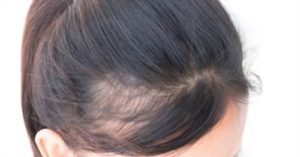 Causes: Hair loss/hair fall can be heredity, or due to hormonal changes, medical conditions or a normal part of ageing. It may just cause general thinning of the hair, or be more apparent in certain areas.
Causes: Hair loss/hair fall can be heredity, or due to hormonal changes, medical conditions or a normal part of ageing. It may just cause general thinning of the hair, or be more apparent in certain areas.
What to do: Restrict heat/chemical treatments. Avoid hairstyles which pull on the hair. Restrict washing to 2-3 times a week. Give bi-weekly scalp massages with an oil known to promote new growth and nourish the follicles to encourage blood circulation and stimulate growth, or more often if the thinning is highly noticeable. Take rucola seed orally.
Recommended treatment oil: almond oil, rucola seed oil
Recommended conditioner: snake (cobra) oil conditioner or rucola seed oil conditioner (massage into scalp and hair)
Healthy hair
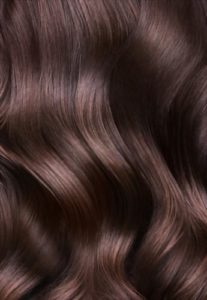 Congratulations if you are able to boast perfectly healthy locks with no problems. Help to keep it that way by always using an oil as a heat protector and always applying a conditioner after each wash.
Congratulations if you are able to boast perfectly healthy locks with no problems. Help to keep it that way by always using an oil as a heat protector and always applying a conditioner after each wash.
Recommended conditioner: jojoba conditioner
Knowledge of your hair type and its needs are crucial when choosing your shampoo, conditioner and oils. Most people have a combination of hair and scalp problems, so treatments can be mixed and matched as required, or oils custom-blended. Remember that your requirements can change according to the season.
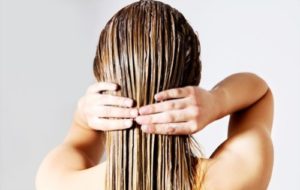 Recommended Hair conditioners:
Recommended Hair conditioners:
Rucola conditioner
Fights hair loss, strengthens and nourishes the hair follicles, eliminates brittle hair, makes the hair more elastic, gives the hair volume, tames stubborn hair, gives shine.
Jojoba conditioner
Moisturises, softens and nourishes, restores weak and damaged hair, balances oil production, improves elasticity and shine.
Black Seed conditioner
Seals in moisture, contributes to enhanced hair growth, strengthens hair follicles, reduces hair fall.
Wheat germ conditioner
Helps renew the structure of damaged or weak hair, restores moisture and softness, stimulates healthy hair growth, maintains scalp health, imparts shine.
Cobra (snake) oil conditioner
Regenerates damaged hair follicles, stimulates growth, controls dandruff and scalp disorders, prevents hair fall, restores moisture and shine.
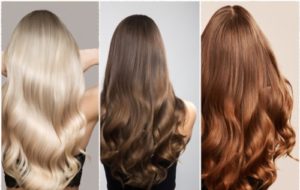 Which conditioner will you add to your hair regime today? Remember that not conditioning your hair after a shampoo is the equivalent of not applying moisturiser to your face after cleansing and toning. You wouldn’t do it to your skin, so please don’t do it to your hair!
Which conditioner will you add to your hair regime today? Remember that not conditioning your hair after a shampoo is the equivalent of not applying moisturiser to your face after cleansing and toning. You wouldn’t do it to your skin, so please don’t do it to your hair!
Enjoy a good hair day every day with the right care.
